Without the slightest hesitation, I’m calling Paolo Sorrentino’s Youth the best movie of 2015. Nothing else comes close. While 2015 has been a good year for movies, I spent all year waiting for that one film that would blow me away, and it was Youth. I watched it knowing nothing about it, except that it starred Michael Caine and was made by the same man who made The Great Beauty, a film that (rightly) won the Best Foreign Language Film Oscar for 2014 (also the BAFTA and Golden Globe in the same category). I was hopeful, but that’s all. It grabbed me from the very beginning and never lost me, bringing me to tears more than once (and not in any cheap manipulative way) — and more so on subsequent viewings (I’m up to three). Once I saw how the film had to end (on that first viewing), I realized that the climax could make or break the movie, depending on the quality of one thing (which I won’t reveal here). Happily, it came through.
This is a rich, rewarding, expansive movie — one that effectively straddles the gulf between art movie and popular film. (And, yes, for the subtitle-phobics, it’s in English, though the cast might have tipped you off.) The title is perhaps ironic — considering the film’s main characters, Caine and Harvey Keitel, are hardly young — but by the end of the film, you may think otherwise. Youth is a good bit like Fellini’s 8 1/2 (1963) and has elements of Ken Russell’s Mahler (1974) — with maybe just a touch of Visconti’s Death in Venice (1971) — but is ultimately, its own beautiful thing.
There is less a plot than a situation — or a series of situations. It mostly takes place at a health spa in the Alps where retired composer Fred Ballinger (Caine) and his best friend, filmmaker Mick Boyle (Keitel), have been coming for years. Also in residence is a young actor named Jimmy Tree (Paul Dano) and, on occasion, Ballinger’s daughter Lena (Rachel Weisz). For atmosphere, there’s also a (frequently nude) Miss Universe (Madalin Ghenea), a Buddhist Monk (Dorji Wangchuk) — who may or may not be able to levitate — and a few other (often peculiar) characters. What stories there are concern the efforts to get the determinedly retired Ballinger to conduct a royal command performance of his early composition, “Simple Songs”; Boyle trying to pull together a screenplay; and Tree trying to gain status as a serious actor. Into that mix comes Lena’s husband (who also happens to be Boyle’s son) dumping her for a pop star. And then Boyle’s star, Brenda Morel (Jane Fonda), shows up. There’s more, but none of it reads in any manner like the film plays out.
This is a grand banquet of a film. It flits effortlessly between comedy, regret, sadness, hope, resignation and maybe redemption. The movie mixes fantasy with reality and playfulness with the deadly serious. It chooses carefully what mysteries it will reveal and which it keeps to itself — and is dead on the mark in every instance. It is the kind of work — much like Sorrentino’s The Great Beauty — that could have fallen apart at any moment and miraculously doesn’t. The fact that it dares this risk is part of its greatness.
The performances are all exceptional — Caine, in particular, is outstanding, but the others (including Fonda’s short appearance) are not far behind. The cinematography is beautiful to behold, and the music by American composer David Lang is stunning. In a way, Youth actually is more like a great, slightly impenetrable musical composition that suggests as much as it states — than it is like a movie. And yet it is a movie — and a truly great one. Rated R for graphic nudity, some sexuality and language.
Playing at Carolina Cinemas and Fine Arts Theatre.




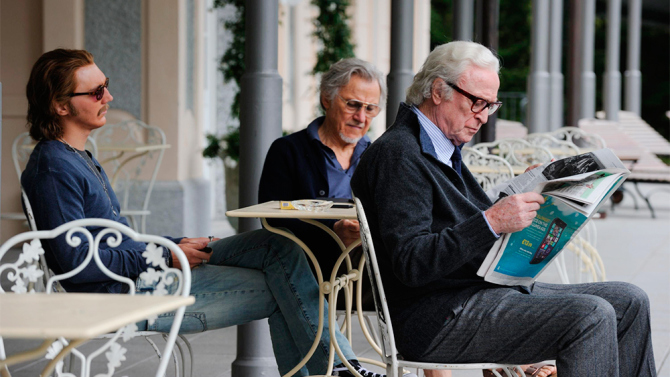
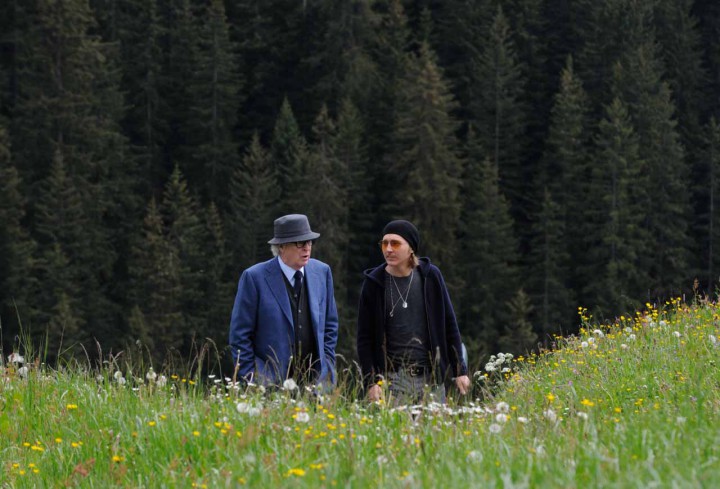
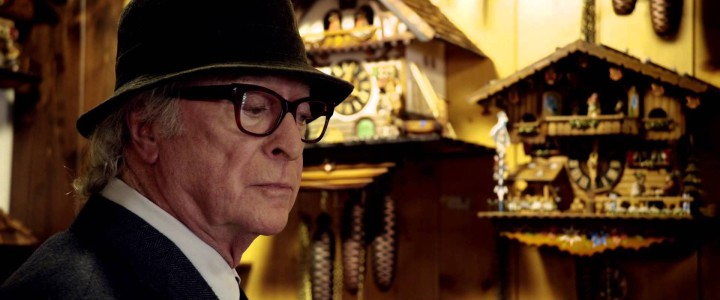
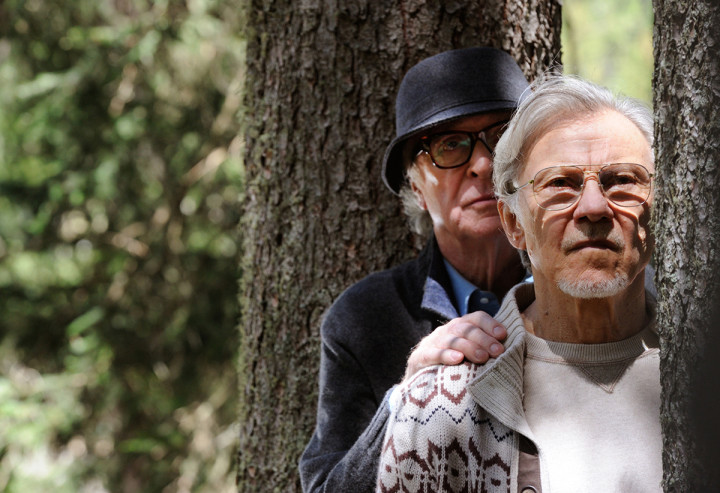
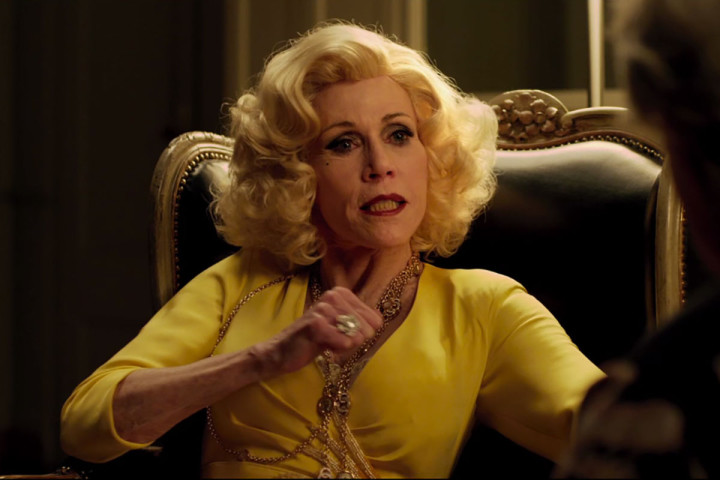
I wish I had liked this as much as you. I left leaving the theater with a good deal of frustration. Sorrentino’s style is so thick – which is a mirror image of superior filmmakers than being distinct – that it muted the angles of life he was trying to explore.
Your review does kind of make me want to check it out again. I love the cast, although I cannot for the life of me support the Fonda Awards love. Fonda doing her schtick tenfold is not something I can commend. If you’re gonna nominate a supporting actress, let it be Weisz.
I do not have the same response to Sorrentino’s style that you do, so we are starting from a different place from the very onset.
I don’t know of another filmmaker who has Sorrentino’s style. It seems very much his own.
I see the influences on him, but there’s nought wrong with that — so long as it becomes its own thing. And his certainly does.
As I understand things at this moment, you, Fran, Chip Kaufmannm and I are all calling this the best of the year.
Wes Anderson? Me and my girlfriend both thought so.
I don’t see it – and Wes Anderson is my favorite filmmaker.
But I like both of them, so feel free to elaborate.
I’d like to try: I think the likeness with Anderson is in the way scenes are staged so precisely, or the setting can have such elaborate opulence or dramatic backdrop, or dialogue is melodramatic but delivered in a dry quiet way. The costuming and the diversity (and quirkiness) of characters and the importance of each personal story line wrapping up. Oh, and the children that speak like adults.
Specific scenes: When Rachel Weisz airs grievances to her silent father while they’re both symmetrically bound in mud baths, then his table is slowly lowered first, and the camera lingers quietly…that reminds me of Wes Anderson. Also the scene with the two men on the Gondola, and their brief clever conversation without eye contact, symmetrically arranged in their own color coordinated outfits. The dinner scenes also remind me of Anderson.
Mind you, I’m not saying identical, just reminds me a bit. Perhaps if I’d seen more directors and films from different eras I’d have a different tune. I’ve heard a few folks refer to Fellini. I’ll try to check out some of his stuff. Any suggestions?
The intricate arrangement of every element of every shot may be similar, but the look – lighting, color, compositions, camera movements, editing – of Anderson’s and Sorrentino’s films have little in common for me. The quirkiness also felt divided by an ocean (at least). Honestly, Anderson never came to mind watching Youth or The Great Beauty.
I’ve heard a few folks refer to Fellini. I’ll try to check out some of his stuff. Any suggestions?
I’ve only seen The White Sheik and 8 1/2, but both are great.
Thank you for your rich review of a beautiful movie. While I did not think it was the masterpiece that the Great Beauty was, I thought it was layered and nuanced and gorgeously filmed. I don’t think there is another director who uses the vast space of the screen with as much visual acuity as Sorrentino. And he also knows how much impact music can have and uses it beautifully. I just saw it today, so I am still absorbing. I believe I will see it again.
I think you will find it warrants another viewing.
I was deeply moved by this movie. It wasn’t perfect; the film maker seems to have some of the same indulgences as Wes Anderson that take me out of the film. And he lingers unnecessarily on young female nudity, under the guise of emphasizing the various themes of the film when in fact it was just gratuitous and uneven.
But that to me now seems trivial. I was floored by this movie and need time or re-viewings to take it in. The rich imagery, the very real and powerful feelings, (without loud voices or overacting), the tragedy and beauty- it all created a soup of emotion in me that I had to sit very still for a bit, then walk around town, when the movie ended. It’s not that the end itself was so powerful, but the cumulative effect of every moment, starting from the opening scene, that put me in a state of deep reflection, nostalgia, regret, hope and mystery. I am really grateful for this because effects like that are what I hope for in art.
There are things in this movie that worked on me on a deep level and I didn’t notice. But there are just as many that I did notice and delighted in. The beautiful vivid colors. I was able to feel Earth and society, (movies often seem to favor one over the other). The characters were complex transcending creatures and at the same time vulnerable simple mammals (i.e. the ample presence of cows, and the statement “She’s just blowing in the wind -” ” -We all are”) My favorite scenes in the movie are those that are a beautiful moment unto themselves and don’t need the plot at all to be profound and wonderful. And that’s most of them.
I totally get that some people (like my girlfriend who watched it with me) don’t really feel satisfied by its style. I agree with Hanke’s review that the movie is not so much a story as it is a portrait. While it manages to have a beginning, middle end, none of the characters change. We didn’t get that ‘satisfaction’ of seeing anyone resolve or learn anything. This was not a film about anyone’s journey, as it is about emotions, consequences, the place of beauty and passion and our duty to our relationships in life. It pits art against real life in a way that doesn’t make art nor relationships seem like some holy grail, but more like yin and yang. It doesn’t answer any questions, and its tragic, but is also just so damn pretty and sweet. Yay for good movies!
I’m glad you liked (loved?) the film. Maybe it’s because I don’t think much about things like nudity (or profanity), but other than naked Miss Universe in the pool, I didn’t notice that much skin in the film. (Bear in mind, however, that someone once objected to me recommending I Heart Huckabees because of all the profanity — something I’d scarcely noticed. Then I watched it again and, yeah, the language is pretty salty, but that wasn’t what I’d taken away from the movie.)
I would, however, argue that we do see learning and change throughout the film. Staying out of the realm of saying too much…consider the scene between Paul Dano and Miss Universe, the later scene with him and the fan in the clock shop, his reaction at the concert . Consider Rachel Weisz when she hears Caine’s reason for refusing the command performance. Consider her and the mountain climber. And I’d say Caine is indeed changed by the end…but the film leaves just how and even why a mystery.
none of the characters change
Majorly disagree. I think Fred, Mick, Jimmy and Lena all change significantly. Even Brenda is much different in her final appearance.
Well, in response I might consider the difference between resolution and change, or reaction and change, but ultimately I think you and Edwin are probably right. Especially regarding Jimmy, I forgot about his whole epiphany and process. The characters did change. I think my point in that statement was to emphasize that there was more going on in this movie than the plot and where it went. It was more about what the people struggled with, and how they struggled with it, and not as much about where they ended up, compared to other films. I can’t wait to watch it again. (I feel similarly about Bukowski’s writing, if that’s any help).
Regarding the nudity, there was lots of human form beauty of both genders and all ages and I liked that a lot. Men and women were shown with tender vulnerability. But I am cautious about the rich white male influence on films and it can disappoint me to see white naked young women as a plot device representing the pinnacle of youth. There are other genders and races. Especially considering the movie’s allusion to Fred’s bisexuality and sexual experiments. Along similar lines there were little unconscious things like the locker room clips at the beginning: why did they show two women taking of their shirts, but the men were all fully clothed? It may seem small, but it just strikes me as unconscious male dominance. Not going to let it bring the movie down at all, but its worth it to me to point it out, and take the risk of being over sensitive.
Not to keep knocking almost everything you say, but the director is Italian and Miss Universe is Romanian.
At the risk of coming off as vapid or uninformed, I would appreciate some clarity on this comment “the director is Italian and Misss Universe is Romanian.”
It is in response to Matt’s comments of “the rich white male influence on films” and “white naked young women as a plot device representing the pinnacle of youth,” neither of which I think applies to the multicultural Youth.
Okay. Thank you for that.
“rich, white male”…etc.
I try to stay away from generalizing . It reduces everything down to the lowest common denominator.
I find the very fact that Matt wants to get beneath not just the surface of a film he likes, but beneath his reactions to the film rather encouraging.
I found the costume design in this extremely compelling.
You’ve seen this????
It was the last film I saw in 2015.
I take it since you went out humming the costumes, you weren’t very taken with it.
I have to admit, not as much as I was hoping to be, which is not to say there weren’t some moments that engaged me strongly.
But I did legitimately find the costume design to be excellent.
I have to admit, not as much as I was hoping to be
Pity about that. Will we be seeing a Best of list from you this year? (The one here won’t go live till Jan. 12.)
The front page of the handy website canistream.it has a poster for Youth. I clicked on it and it took me to a page that maybe kinda sorta has its wires crossed: http://www.canistream.it/search/movie/5563b000f5f8077c31ff492b/youth
YOUTH came out on DVD and is at Redox as of this week. I came aware of it by researching to see what Harvey Keitel had done as late. I grabbed it up as soon as I saw it on the Redox list! I was very impressed and plan to see it over and over again when ever I can. I thought the movie was everything Ken described. Thanks, Ken, for another brilliant review!
I just watched this film on an airplane crossing the Atlantic. It made me weep. This is one of the best movies I have seen in my entire life. It is stunning! Finally a film with a message. This is “film” at it’s greatest.